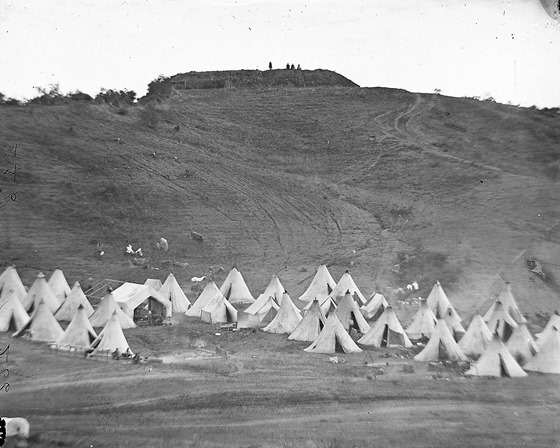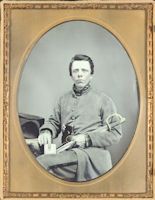A Visit to the Battle-field of Bull Run.
Headquarters Second Vt. Brigade,
Union Mills, Va., June 15, 1863.
Dear Free Press:
The theatre of active conflict has been approaching us sensibly of late. The battle of last Tuesday[1] took place near Rappahannock Bridge and Beverly’s Ford, where the Twelfth Vermont was stationed but a few days ago. Since then the outposts of Hooker’s army and of this brigade, have been in daily contact. This morning we see the dust and hear the distant drums of two army corps, moving back to this line. The impression is general that the next big fight may take place in this vicinity, perhaps rendering thrice memorable the historic ground of the two great Bull Run battles.
I visited that battle ground on Saturday last. The troops of our brigade have long guarded Blackburn’s Ford and have picketed upon the outskirts of the ground; but the actual battle field has been outside of our lines, and traversed so frequently by rebel scouting parties, that it has not been safe to visit it except with a party of strength enough to take care of any squad of “bushwhackers” or Mosby’s rangers.
For our excursion we had Col. Blunt, Lieut. Col. Farnham, Major Kingsley, Captains Ormsbee and Paul, Adjutant Vaughan, Lieut. Cloyes, Drum-Major Downer, and Hospital Steward Hard, of the Twelfth; Col. Randall and Surgeon Nichols of the Thirteenth; Adjutant Peabody, Quartermaster Henry, and several other officers of the Sixteenth; Medical Director Ketchum;. Quartermaster Brownson, Lieut. Prentiss, Lieut. Thompson and your humble servant of Gen. Stannard’s staff; and orderlies and attendants enough to make a cavalcade of twenty-five. It was a party whose capture would have made something of a hole in the Second Vermont brigade, but we saw no armed enemy.
Starting from Union Mills we crossed Bull Run at McLean’s Ford, and struck off towards the battle field, some five or six miles thence in a direct line; but following the windings of the interminable bridle paths which intersect every piece of forest and traverse every valley and field with a network, we made a longer distance of it. For a while we kept near the bank of the Run, edged with trench and breastwork for mile after mile on the southern side. These were Beauregard’s works, and well constructed, as the rebel works generally are in this region. Leaving these we came out in time to a more open country, and Col. Randall and Adjutant Peabody, who were members of the old Vermont Second, at once recognized the neighborhood of their first battle. Soon we were on the spot where Rickett’s battery was taken. The ruins of the Henry house, around which the battle raged and in which a woman was killed, were near us. The rose bushes still grow in the rank grass which covers what was once the door-yard or flower-garden, and blossom as freely as if the storm of battle had never swept over them. A grave, protected by some rails thrown around it, near the ruined chimney stack, we conjectured to be possibly the resting place of the hapless occupant, whose fate gave her a place in the history of the first great battle of the great War for the Union. The grave of Lieut. Ramsay, and the spot where Col. Bartow, of Georgia, fell —once marked by a small marble monument, which for some reason was removed to Manassas Junction by the rebels last summer—are also right there. Plucking some roses to be pressed and sent home as mementoes of the battle ground, we passed on over the field. Guided by Col. Randall we saw where the fighting opened on the right and centre; where the Second Vermont, then a regiment a month old, first went into action; where it did its fighting; where, upon the attack of fresh forces upon our right, it was ordered to fall back; and where its dead were collected and buried. Many of the dead who fell in both the battles of Bull Run, were not buried in graves but simply covered with earth as they lay, and skulls and bones frequently protrude from the little mounds; but the Vermonters seemed to have been decently interred in a row. There are no head-boards to mark the graves, and the grass grows thick over them. We passed by Dogan’s house, still standing though unoccupied; we saw, of course, “the stone house,” windowless and deserted and marked by cannon shot; and we took our homeward way by the turnpike, fording Bull Run at the famous stone bridge, now a bridge no longer.
On the battle-ground I saw not a trace of riflepit or earth-work of any description, and the fighting must have been in the main open standup work. The ground is almost covered in one or two spots with skeletons of horses. Its surface is ridged with graves, and strewn with cartridge boxes, remnants of uniforms and knapsacks, and here and there a rusty bayonet or unexploded shell. Many of the marks of the conflict are doubtless hidden by the grass, which grows probably thicker than before on soil enriched by the blood and bones of fallen patriots and rebels. It is now entirely uncultivated and deserted; but several of the farms around and near it are in a pretty good state of cultivation for Virginia, and in time, no doubt, the plough-share will be driven over its slopes, through grave and cannon rut, and all traces of the great battles will become obliterated.
We returned to camp, after a ride taken all together of from 20 to 25 miles, without casualties.
The weather is dry to actual drought. It is over a month since we have had more than a passing shower. The days are generally clear and hot and the nights uniformly cool. It is good weather for the health of our troops.
The regiments have been taking turns, of late, at out-post duty at Bristow’s and Catlett’s. The Twelfth was drawn back to Union Mills a fortnight since, and remains here. The Sixteenth succeeded it out on the railroad, and was succeeded in turn by the Fifteenth.
You understand, of course, that if I have heretofore mainly written of the Twelfth, it is because many of your readers are especially interested in it, and because it is my own regiment, and not because the others are not as well worthy of notice. All are good regiments. The Thirteenth, Col. Randall, I have not seen in line lately, but I hear that it is in a fine state of efficiency and drill. The Fourteenth, Col. Nichols, I saw on review recently, and admired the precision with which they marched and the general good appearance of the men. The Fifteenth and Sixteenth, Colonels Proctor and Veazey, were reviewed here a while since, by Gen. Abercrombie, commanding the division, who expressed surprise and gratification at their fine discipline and appearance. The following order is official testimony to this:
__________
Headquarters Second Brigade,
Abercrombie’s Division,
Union Mills, Va., May 26th, 1863.
Special Order No. 19.
The General Commanding desires to express to the regiments inspected to-day his congratulations on their soldier-like appearance, and to convey to them the approbation of the Division General.
Gen. Abercrombie speaks in high terms of the Review and Inspection, especially of the manner in which both regiments passed through the manual of arms, and noticed with pleasure the attention that has been paid to drill and discipline by both officers and men.
By order of Brig. Gen. G. J. Stannard,
Wm. H. Hill, A. A. G.
__________
It will not be a satisfactory sight, in some aspects of it, to see these fine regiments, each over 800 strong to-day, going home at this critical period of the war. But half of the men, and perhaps more, will re-enlist before the summer is over.
Yours, B.
[1] The cavalry engagement of Brandy Station.











